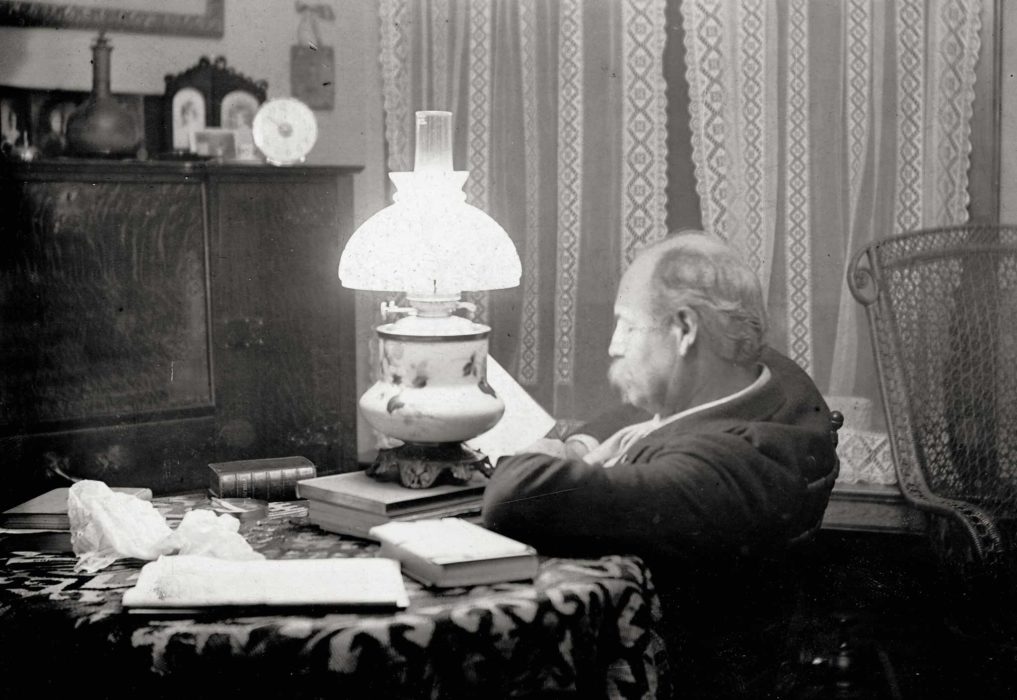‘ABDU’L-BAHÁ’S TRAIN WEST arrived in Glenwood Springs at two o’clock in the morning on Saturday, September 28, 1912. That afternoon the party took a walk in the gardens of the Hotel Colorado, and crossed the bridge to visit the shopping district. As the Colorado River swept beneath them, a messenger approached with some telegrams that had arrived for ‘Abdu’l-Bahá. One of them, from Los Angeles, reported that his friend, Thornton Chase, had been rushed two days earlier to the Angelus Hospital and was awaiting emergency surgery.
Thornton Chase had first heard about Bahá’u’lláh from the speech Dr. Henry Jessup had given at the World Parliament of Religions in 1893. By mid-1894 he was studying the new faith in Chicago. Three other Americans became Bahá’ís before Chase, but, of the four, only Chase had stuck. He was, ‘Abdu’l-Bahá later said, “the first Bahá’í in America.”
When Phoebe Hearst planned her pilgrimage to ‘Akká in 1898, Chase’s work with the Union Mutual Life Insurance Company prevented him from accompanying them. “I am heart broken,” he wrote to one of the party, “to learn that you are going and it is impossible for me to join you.” Instead, he sent along a letter to be hand-delivered to ‘Abdu’l-Bahá, beginning a correspondence between the two men that would unfold over the next fourteen years. Of all the Americans ‘Abdu’l-Bahá knew, none were closer to him than Thornton Chase.

“Dear Master,” Chase wrote in one of his letters, “Thou seest that I am laying my heart bare before Thee.” Chase asked for insight on some of the central dilemmas of his life. Sometimes ‘Abdu’l-Bahá would respond to one letter from Chase with four of his own.
“I desire greatly that I may be of service to GOD,” Chase wrote. ‘Abdu’l-Bahá challenged him to sacrifice everything in service to his fellow Americans.
Chase wanted to know what value and justice there was to the suffering of children and other innocent human beings. ‘Abdu’l-Bahá: “In brief, for those souls there is a recompense in another world . . . . For those souls that suffering is the greatest mercy of God. Verily that mercy of the Lord is far better and preferable to all the comfort of this world and the growth and development of this place of mortality.”
Chase even expressed concern at the leadership role women were assuming among American Bahá’ís, and at some of the statements about gender from ‘Abdu’l-Bahá. “The purport is that some women in this wonderful age have surpassed some men,” ‘Abdu’l-Bahá answered, “and not that all women have surpassed all men.”
Thornton Chase finally made the trip to Palestine in 1907. Even after nine years of letters, Chase was surprised by ‘Abdu’l-Bahá. “I had formed an idea of Jesus as very meek, humble, lowly, gentle, quiet, soft and sweet,” he wrote, “and I looked for such another one. . . . I found in Abdul-Baha a man, strong, powerful, without a thought as to any act, as free and unstilted as a father with his family or a boy with playmates. Yet each movement, his walk, his greeting, his sitting down and rising up were eloquent of power, full of dignity, freedom and ability.” “I have revised my idea of Jesus,” he said.
By the time ‘Abdu’l-Bahá arrived in America in 1912, Thornton Chase’s company had sent him to Los Angeles. By July, ‘Abdu’l-Bahá had decided to cancel his western trip. “O thou, my ancient Friend,” he wrote to Chase, asking him to travel east if his health would permit. But then ‘Abdu’l-Bahá changed his plans, and Chase was ready to travel to San Francisco to meet him. On September 26, Chase quickly wrote a note to a friend: “They have just brought me to the hospital and are going to operate on me . . . . It is a very serious operation and will tie me up here for two weeks or more. Please let Abdul Baha know.”

Thornton Chase died from complications just before 7 p.m. on Monday, September 30. ‘Abdu’l-Bahá was still in Salt Lake City, preparing to leave for San Francisco the next morning. The electrical parade of the National Irrigation Congress had just begun. “Never before in the city’s history were so many thousands of people congregated to witness a similar celebration,” the newspaper reported. As Thornton Chase departed this life, ‘Abdu’l-Bahá was on the streets of Salt Lake City, watching the lights stream by.
In tomorrow’s feature: In his early life, Thornton Chase battles personal tragedy and takes off for the Colorado frontier.






